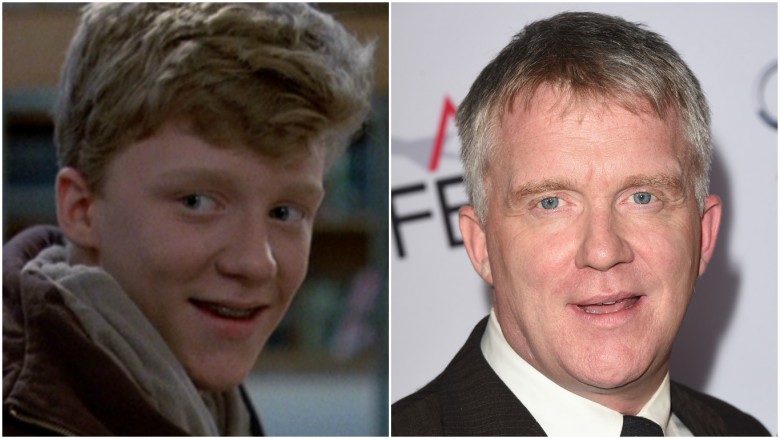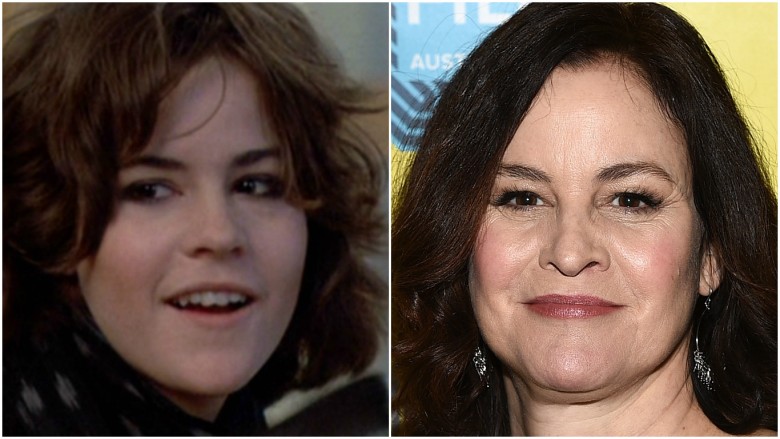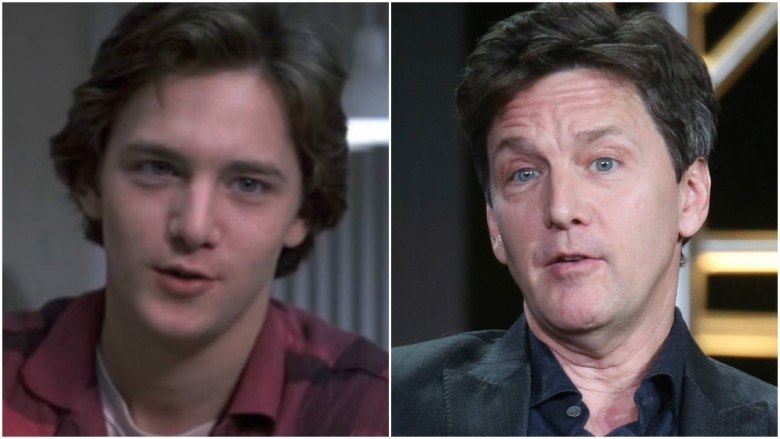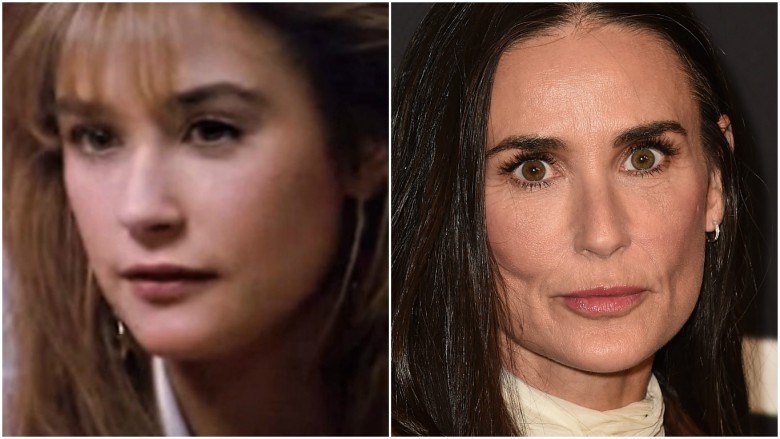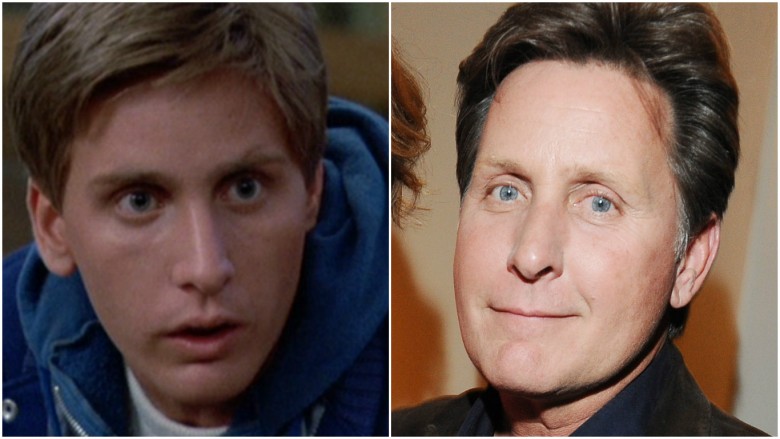What The Brat Pack Looks Like Today
In 1985, New York magazine published an issue detailing the offscreen exploits of a group of young actors, dubbing them the Brat Pack. The phrase would follow these actors around for the rest of their careers, becoming a stumbling block as they matured into adults. While some have fared better than others since the height of their popularity, it's safe to say nobody from the original Brat Pack enjoys the same level of fame they did in the 1980s. Over time, the meaning of the Brat Pack has changed, and it's now commonly accepted as the group of actors that comprised the main casts of two classic films from 1985: John Hughes' The Breakfast Club and Joel Schumacher's St. Elmo's Fire. Here's what they look like today.
Judd Nelson
Often considered the bad boy of the Brat Pack, Judd Nelson had to work hard to avoid being typecast. He was one of three actors Blum's article focused most heavily on, and Nelson definitely came off the worst, painted as an overrated and arrogant young man who would "get angry" if people sat down at the Brat Pack table while they were out.
"These were people I worked with who I really liked as people," Nelson said in response. "Funny, smart, committed to the work. I mean, no one was professionally irresponsible. And after that article, not only are we strongly encouraged not to work with each other again, and for the most part we haven't, but it was insinuated we might not want to be hanging out with these people. And it was like, I didn't know that good friends are so easy to come by in this world that they should be tossed asunder."
Nelson also said he would have been better served following his "gut feeling" and knocking Blum unconscious, though luckily for them both he managed to refrain. His career has had numerous ups and downs since the Brat Pack's heyday, but he recently found a long-awaited taste of critical acclaim playing recurring character Billy Beretti in Fox's hit show Empire.
Molly Ringwald
Molly Ringwald already had Kids' Choice and Golden Globe nominations to her name by the time she met John Hughes in 1984, though it was the late director who would put the young actress on the path to becoming a teen idol. Ringwald shot to prominence with consecutive performances in Sixteen Candles, The Breakfast Club, and Pretty in Pink, all written by Hughes and all considered essential '80s cinema. Although she has previously stated that she didn't hang out with her Brat Pack colleagues because she was quite a bit younger than the other members, she still feels the weight of their contribution to film history.
"It's heavy," the actress admitted. "The more I pursue other things that really, truly matter to me, it's less heavy, but I think the heaviest thing about it is that so many people have so many memories attached to me. It's kind of like this giant collective unrequited love. I wasn't there when they had their first slumber party or their first date or their first kiss, and yet I'm somehow connected to their lives in that way."
While she remains active in the industry, the "other things" she talked about pursuing are in different forms of entertainment. In 2012 she released a young adult novel named When It Happens to You and the following year dropped her debut jazz record Except Sometimes, a "vanity project" that included a cover of the Breakfast Club soundtrack classic "Don't You (Forget About Me)."
Anthony Michael Hall
Anthony Michael Hall could be considered one of the founding members of the Brat Pack, being the first to strike up a working relationship with John Hughes. After making his debut as a streetwise orphan in Kenny Rogers-led comedy Six Pack, Hall won the role of Rusty Griswold in National Lampoon's Vacation, written by Hughes. The young actor collaborated with the director on his first three features, Sixteen Candles, The Breakfast Club, and Weird Science.
"The Breakfast Club was certainly the most prominent of the films but it was actually the two that bookended it that I had the most fun on," the actor admitted during a press tour for his now-canceled show The Dead Zone. "One of the things that John was most gifted at, which is often overlooked, is that he just enabled people. With me, he was always liberating me to try something different and to go for this or that."
Hall quickly became well known for playing variations on the high school geek and sought to distance himself from such roles out of fear of being typecast. In 1986 he rejected parts in Hughes' next two projects (Pretty In Pink and Ferris Bueller's Day Off) and instead accepted the lead in action thriller Out of Bounds, hoping to change the trajectory of his career. He's remained active in the industry since (his most recent appearance was in Ben Affleck's prohibition drama Live by Night), though recently he made headlines for the wrong reasons, assaulting his neighbor in an attack that could see him jailed for up to seven years.
Ally Sheedy
Ally Sheedy made her film bow in Bad Boys—not the 1995 Will Smith and Martin Lawrence buddy flick, the 1983 coming-of-age crime drama of the same name. The film was well received by critics, with veteran reviewer Roger Ebert writing that he had "a notion it will stand as one of those benchmark movies that we'll look back at for the talent it introduced." While star Sean Penn went on to carve out a distinguished career, the actress that played his unfortunate girlfriend was already reaching her peak.
Sheedy was everywhere at the time, not only in Brat Pack benchmarks The Breakfast Club and St. Elmo's Fire, but in numerous other '80s classics. She starred opposite Matthew Broderick in cold war thriller WarGames, reunited with Judd Nelson for small town revenge flick Blue City, and took center stage in cult sci-fi comedy Short Circuit. While she remembers those years fondly, moving on proved difficult because of the "pressure to break out and become a success individually" inflicted on her by the Brat Pack label.
She saw out the 1990s with a couple of relatively well-received films in High Art and Sugar Town, though the following decade saw her moving into TV movies and cameo roles. She still pops up in small cameo roles today (observant X-Men fans will have recognized her as Scott's teacher in Apocalypse) though she recently mounted a genuine comeback in dark comedy Little Sister, delivering an "award-caliber" performance as a manic-depressive mother.
Andrew McCarthy
Andrew McCarthy started his career with a role opposite future Brat Pack veteran Rob Lowe in 1983's Class, going on to make a name for himself as an affable young lead in St. Elmo's Fire and Pretty In Pink. What didn't come across in his wholesome performances was the alcohol problem he'd been fighting since age 12. He admitted to being hung over during the entire Pretty In Pink shoot, and by 1992 the effects of long-term abuse began to show.
After completing a rehab course, McCarthy continued to work, but fewer offers came his way. He saw out the '90s with no fewer than six TV movies, and starred in six more by the time Law and Order came calling in 2003. His time on the procedural didn't last long, however, and he was shown the door after he "engaged in fractious behavior" with series regular Vincent D'Onofrio. It wasn't the first time McCarthy had been known to lose his temper, either.
The actor had a previous run-in with a journalist from The Observer whom he berated in a public restaurant after he asked about the Brat Pack. "It didn't exist!" McCarthy said with a raised voice. "You all had the experience that you wanted to be part of, this kind of group with success, and it just wasn't. That's not what it was in my experience." He hasn't done a feature film since 2011 and his latest attempt at cracking the TV market ended badly when ABC's The Family was canceled after a single season.
Demi Moore
Demi Moore was fashionably late to the Brat Pack party, missing The Breakfast Club but making a lot of noise in St. Elmo's Fire. She and co-star Rob Lowe wasted no time in pulling ahead of the pack the following year, starring opposite one another as Chicago yuppies in About Last Night, a film that beat St. Elmo's Fire at the box office and propelled both actors towards stardom. Moore went on to establish herself as a genuine leading lady in the '90s, kicking off with Ghost (the second highest-grossing film of the year after Home Alone) and going on to star in a string of hits.
Reports from 1996 show Moore was the highest-paid actress in Hollywood at the time, raking in a record-breaking $12.5 million for Striptease. Unfortunately for Moore, the erotic comedy was a total disaster, dominating the 17th Golden Raspberry Awards with wins in six areas including the humiliating Worst Picture category. She looked to bounce back with something gritty, shaving her head for Ridley Scott's G.I. Jane and sinking her own cash into it as a co-producer, though when the movie failed to hit the mark, her career took a severe nosedive.
In the years that followed she became best known for her relationship with Ashton Kutcher, the subject of constant media attention because of the 15-year age gap between the two. Kutcher became Moore's third husband in 2005, and the couple divorced in 2013.
Emilio Estevez
David Blum, the journalist who penned the original 'Hollywood's Brat Pack' piece, referred to Emilio Estevez as the "unofficial president" of the group, and his theory was backed up by the man who directed the actor in St. Elmo's Fire. According to Joel Schumacher, "if you asked everyone in the cast who their best friend is, they'd all say Emilio. He's that kind of guy." Whether he wanted the moniker or not, Estevez became the face of the Brat Pack, and as a result he felt the weight of its connotations the most.
When the '90s rolled around, Estevez was still best known as the star of The Breakfast Club and St. Elmo's Fire. 1988's Young Guns was unfairly tarred with the Brat Pack brush, and when the 1990 sequel ended up getting the same treatment, he knew he needed to do something different. That came in the form of Gordon Bombay, the drunk-driving lawyer forced to coach a peewee hockey team as part of his community service in 1992's The Mighty Ducks.
Ducks proved a huge hit for Disney, and the studio quickly set about preparing two sequels in which Estevez reprised his role. However, while he succeeded in shedding his Brat Pack image over the course of the cult trilogy, by the end of the '90s he was doing TV movies. Today, Estevez spends his time behind the camera, with his upcoming feature The Public set to star Alec Baldwin and Christian Slater.
Rob Lowe
If Emilio Estevez was the president of the Brat Pack, then Rob Lowe was his VP. Blum's damaging piece described Lowe as "inviting too much attention from the girls" and predicted that the attention would ultimately lead to his undoing. By 1988, Lowe had dreams of starring in a Martin Scorsese movie and was desperately trying to shake his Brat Pack image; as part of his new, much more serious public persona, he campaigned for presidential hopeful Michael Dukakis.
After attending a political event in Georgia, Lowe went clubbing with Brat Pack pals Judd Nelson and Ally Sheedy. He went home with two girls who both agreed to record the encounter that followed, but what they didn't tell Lowe was that they planned to sneak off with the tape while he was in the bathroom. Sections of the tape ended up in circulation (the first commercially available celebrity sex tape), and Lowe's plans to reinvent himself were shattered, yet he remained grateful that he was able to have any kind of career at all.
"I've been fortunate that I've always, always, always worked." Lowe confessed. "Even after the sex tape was made public, it was like: You're still a professional baseball player, but you're playing for Double or Triple A. I lost the role in Titanic that Billy Zane got. But I was never banned from the game."



